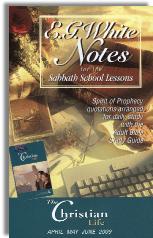|
||||||||||
Commentary on "Grace"
Day 6: Thursday, May 14, 2009
Overview
Thursday's lesson starts out by discussing the need to keep our focus of "truth" clear. Here is an excerpt of this thought from the lesson, "For some, the focus of their faith is either on the Bible, or on the church, or on the traditions or doctrines of their church. While all these have their role, they can be very problematic if they turn us away from Jesus, who alone is the Source of our salvation. As Seventh-day Adventists, we often refer to the "truth" as the focus of our faith. There is nothing wrong with that, as long as we do not reduce our concept of truth to a list of doctrines to which we intellectually ascribe. Our faith should find it's center in the truth as we find it in Jesus. We believe in a Person who has revealed our God to us, who has come to redeem us, who presently is our heavenly mediator, and who will return to take us home."
The lesson continues by referring to Ephesians 2:4-10 stating that we are saved by grace; our salvation cannot be earned. It is a free gift of God.
It ends with the following questions, "How should the doctrines we have as Adventists help us better understand what Christ has done for us? Suppose, for instance, that you believed in eternal torment in hell. How would that, or other false teachings, impact your understanding of Christ? Why then are correct doctrines so important in helping us come to know Jesus better?"
Problems
The author makes the assumption that the Seventh-day Adventist "truth" is truth. Because of this underlying assumption, he implies that any problems with the Seventh-day Adventist view of "truth" is a result of misdirected focus rather than actual content. He states that if the doctrine is reduced to being merely intellectual, then our focus is wrong because our focus needs to be centered in Jesus. Again, under the assumption that the "truth" of the Seventh-day Adventist doctrine is correct, he continues to describe Jesus as "a Person who has revealed our God to us" and "who is presently our heavenly mediator".
It is correct that our focus needs to be on Jesus. But in order for our focus to be on Jesus, it is important that we evaluate whether the Seventh-day Adventist Jesus is the same Jesus the Bible describes. The best way to address this issue is to answer the final thought question listed at the end of the lesson, first from the perspective of the Seventh-day Adventist church, and then from a Biblical perspective. Note the differences.
How should the doctrines we have as Adventists help us better understand what Christ has done for us?
SDA Fundamental belief #24 (Jesus' actions and what He has done for us are highlighted in bold)
”There is a sanctuary in heaven, the true tabernacle which the Lord set up and not man. In it Christ ministers on our behalf, making available to believers the benefits of His atoning sacrifice offered once for all on the cross. He was inaugurated as our great High Priest and began His intercessory ministry at the time of His ascension. In 1844, at the end of the prophetic period of 2300 days, He entered the second and last phase of His atoning ministry. It is a work of investigative judgment which is part of the ultimate disposition of all sin, typified by the cleansing of the ancient Hebrew sanctuary on the Day of Atonement. In that typical service the sanctuary was cleansed with the blood of animal sacrifices, but the heavenly things are purified with the perfect sacrifice of the blood of Jesus. The investigative judgment reveals to heavenly intelligences who among the dead are asleep in Christ and therefore, in Him, are deemed worthy to have part in the first resurrection. It also makes manifest who among the living are abiding in Christ, keeping the commandments of God and the faith of Jesus, and in Him, therefore, are ready for translation into His everlasting kingdom. This judgment vindicates the justice of God in saving those who believe in Jesus. It declares that those who have remained loyal to God shall receive the kingdom. The completion of this ministry of Christ will mark the close of human probation before the Second Advent.
The Bible states:
Believers HAVE the benefits of His atoning sacrifice. It is not just simply "made available to believers".
"My sheep hear My voice, and I know them, and they follow Me; and I give eternal life to them, and they will never perish; and no one will snatch them out of My hand. My Father, who has gen them to Me, is greater than all; and no one is able to snatch them out of the Father's hand." (John 10:27-29)
"Truly, truly, I say to you, he who hears My word, and believes Him who sent Me, has eternal life, and does not come into judgment, but has passed out of death into life." (John 5:24)
At His ascension, Jesus went to be with His Father, and is seated at the Father's right hand. He is not presently our intercessory mediator.
"But He, having offered one sacrifice for sins for all time, sat down at the right hand of God." (Hebrews 10:12)
Jesus' atoning ministry did not have phases. The atonement was finished and completed at the cross.
"...He said, 'It is finished!'" (John 19:30)
"For by one offering He has perfected for all time those who are sanctified." (Hebrews 10:14)
Jesus does not need to reveal or vindicate His ways to heavenly intelligences.
"On the contrary, who are you, O man, who answers back to God? The thing molded will not say to the molder, 'Why did you make me like this,' will it?" (Romans 9:20)
The author asks at the end of the lesson, "How would that [belief in eternal Hell], or other false teachings, impact your understanding of Christ?" The purpose of this commentary is not to discuss the Biblical truths of hell, but rather to point out that proper theology can only be formed from studying Scripture inductively. It is important to point out the fallacy of approaching a doctrine first from the assumption that it is true, and then using the Bible to interpret that "truth". That approach leads to error, proof-texting, and a confusion about what the Bible truly teaches. The results of a deductive style of study depends upon the reasonings of man whereas inductive study depends upon wisdom that comes from God's inspired Word. Simply put, deductive study centers around the flesh, whereas inductive study relies on the Spirit.
In brief, there are three parts to Inductive Bible Study:
- Observation: What does it say?
– Pray asking God to teach you, to keep you in truth, and to stay objective
– Find out the context of the passage
– Look for the obvious facts about the people, places, events, etc.
– Ask questions: who, what, when, why, where - Interpretation: What does it mean?
- Application: How does the meaning apply to me?
It is critical that all of the facts in the observation phase are correct since the interpretation and application depend on it. Studying the Bible inductively and honestly will open one's eyes and heart's understanding to the truth God desires for them.
Summary
- There are significant differences between the teachings of the SDA church and the Bible about the work of Jesus and who He is.
- Real truth can only come from the Bible, not a set of doctrines or fundamental beliefs.
- When studying the Bible, it is important to approach it inductively rather than deductively.
- Honest Bible study can only come from studying a passage without being biased by previous understanding, experience, or extra-biblical sources.
Copyright 2009 BibleStudiesForAdventists.com. All rights reserved. Revised May 7, 2009. This website is published by Life Assurance Ministries, Glendale, Arizona, USA, the publisher of Proclamation! Magazine. Contact email: BibleStudiesForAdventists@gmail.com.
The Sabbath School Bible Study Guide and the corresponding E.G. White Notes are published by Pacific Press Publishing Association, which is owned and operated by the Seventh-day Adventist church. The current quarter's editions are pictured above.
Official Adventist Resources
Standard Edition Study Guide Week 7
Teacher's Edition Study Guide Week 7
Easy Reading Edition Study Guide Week 7
Search the Complete Published Ellen G. White Writings


